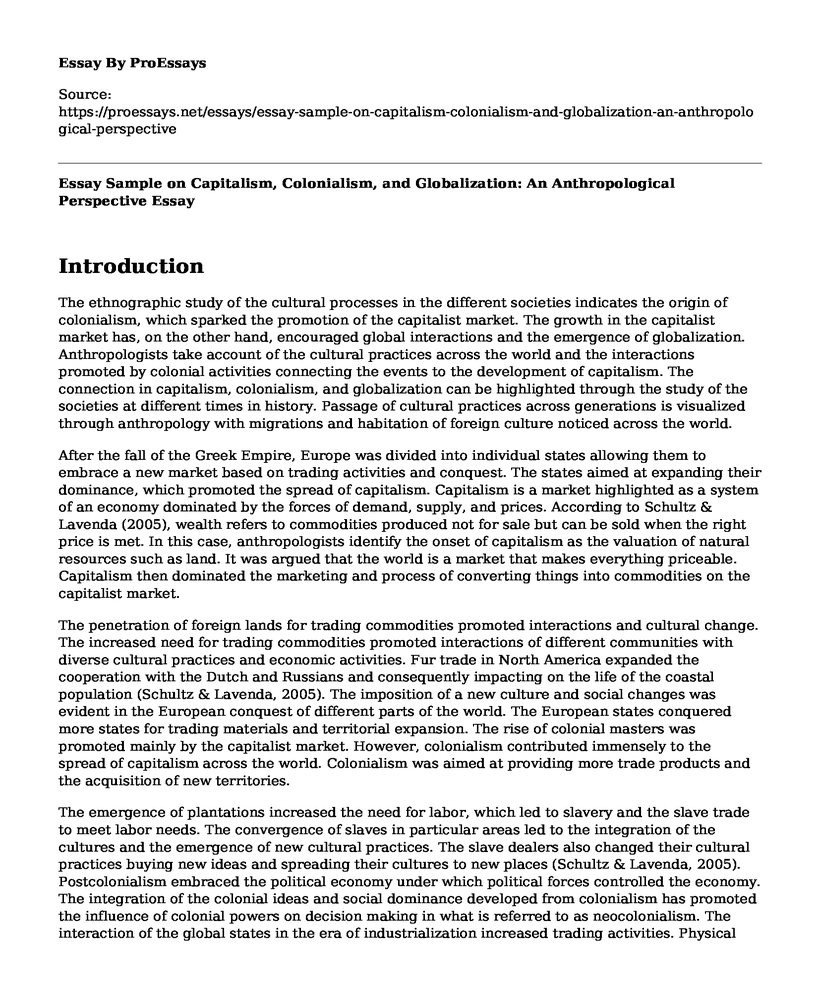Introduction
The ethnographic study of the cultural processes in the different societies indicates the origin of colonialism, which sparked the promotion of the capitalist market. The growth in the capitalist market has, on the other hand, encouraged global interactions and the emergence of globalization. Anthropologists take account of the cultural practices across the world and the interactions promoted by colonial activities connecting the events to the development of capitalism. The connection in capitalism, colonialism, and globalization can be highlighted through the study of the societies at different times in history. Passage of cultural practices across generations is visualized through anthropology with migrations and habitation of foreign culture noticed across the world.
After the fall of the Greek Empire, Europe was divided into individual states allowing them to embrace a new market based on trading activities and conquest. The states aimed at expanding their dominance, which promoted the spread of capitalism. Capitalism is a market highlighted as a system of an economy dominated by the forces of demand, supply, and prices. According to Schultz & Lavenda (2005), wealth refers to commodities produced not for sale but can be sold when the right price is met. In this case, anthropologists identify the onset of capitalism as the valuation of natural resources such as land. It was argued that the world is a market that makes everything priceable. Capitalism then dominated the marketing and process of converting things into commodities on the capitalist market.
The penetration of foreign lands for trading commodities promoted interactions and cultural change. The increased need for trading commodities promoted interactions of different communities with diverse cultural practices and economic activities. Fur trade in North America expanded the cooperation with the Dutch and Russians and consequently impacting on the life of the coastal population (Schultz & Lavenda, 2005). The imposition of a new culture and social changes was evident in the European conquest of different parts of the world. The European states conquered more states for trading materials and territorial expansion. The rise of colonial masters was promoted mainly by the capitalist market. However, colonialism contributed immensely to the spread of capitalism across the world. Colonialism was aimed at providing more trade products and the acquisition of new territories.
The emergence of plantations increased the need for labor, which led to slavery and the slave trade to meet labor needs. The convergence of slaves in particular areas led to the integration of the cultures and the emergence of new cultural practices. The slave dealers also changed their cultural practices buying new ideas and spreading their cultures to new places (Schultz & Lavenda, 2005). Postcolonialism embraced the political economy under which political forces controlled the economy. The integration of the colonial ideas and social dominance developed from colonialism has promoted the influence of colonial powers on decision making in what is referred to as neocolonialism. The interaction of the global states in the era of industrialization increased trading activities. Physical migration of companies to areas with favorable cultural practices is evident in modern society. Global market forces control the sharing of ideas and market determination. Globalization has influenced the emergence of new cultural practices and the spreading of various cultural practices across the world.
Conclusion
In conclusion, capitalism was developed in Europe in the establishment of a new market structure based on trade and conquest. The emergence of colonialism acted as a trigger to widespread capitalism across the world. Colonialism enhanced the interactions among diverse cultures hence the sharing of cultural practices. The growth in trade and global communications has contributed to modern globalization, which promotes capitalism.
Reference
Schultz, E. A., & Lavenda, R. H. (2005). Cultural anthropology: A perspective on the human condition (Vol. 1). Oxford University Press, USA.
Cite this page
Essay Sample on Capitalism, Colonialism, and Globalization: An Anthropological Perspective. (2023, Apr 10). Retrieved from https://proessays.net/essays/essay-sample-on-capitalism-colonialism-and-globalization-an-anthropological-perspective
If you are the original author of this essay and no longer wish to have it published on the ProEssays website, please click below to request its removal:
- Millennial Views in Context - Essay Example
- Racism, Colonization, and Civilization Essay
- Japanese Culture and Civilization Essay
- Theory of Knowledge: Doubt Is the Key of Knowledge Essay
- Essay Example on Aging and Dying: Dreaded Life Stages of Human Living
- Essay on 2050 - Humanity's Race Is Transforming: Yuval Noah's Insightful Article
- Essay Example on Will Humans Win the Race Against Machines? AI and the Digital Revolution







